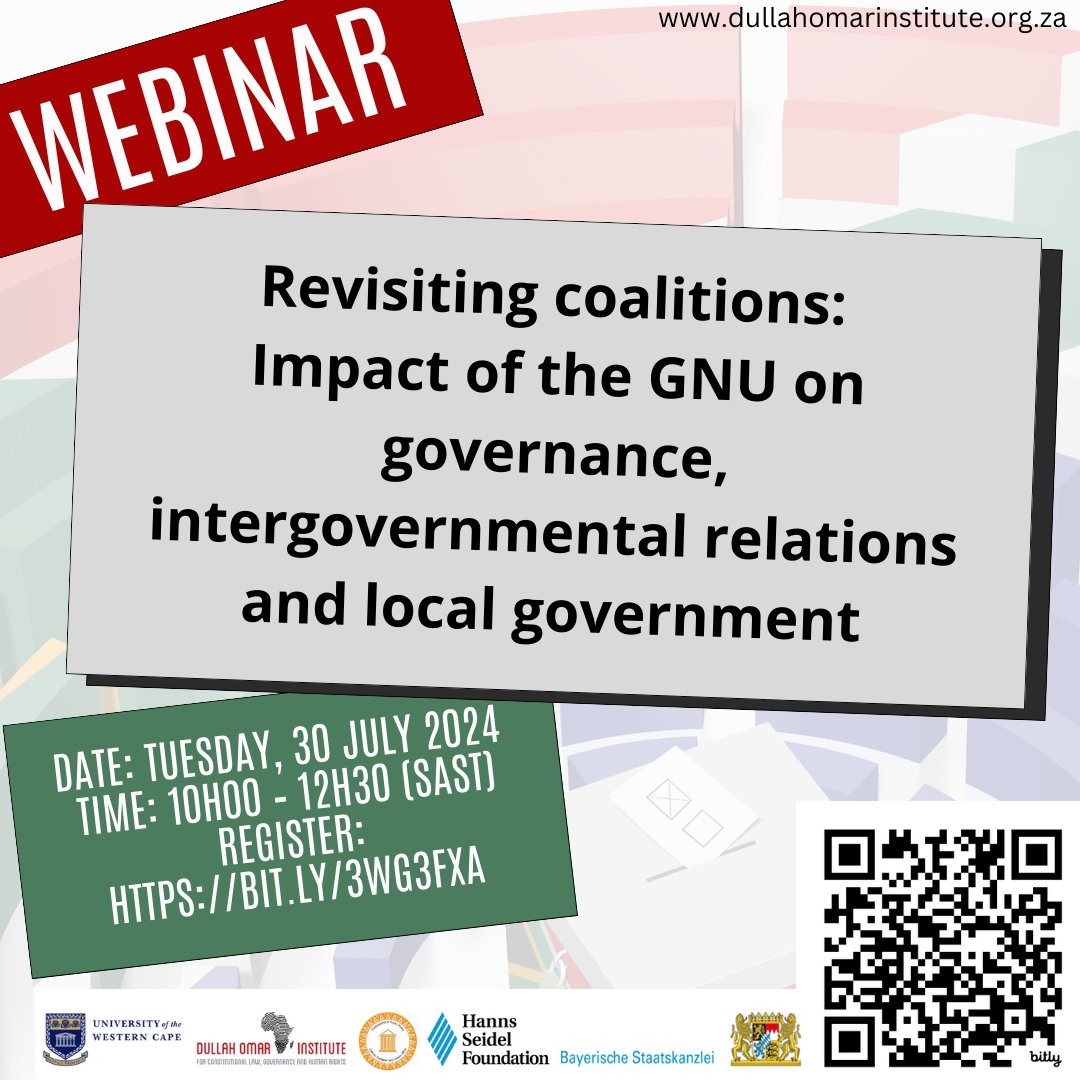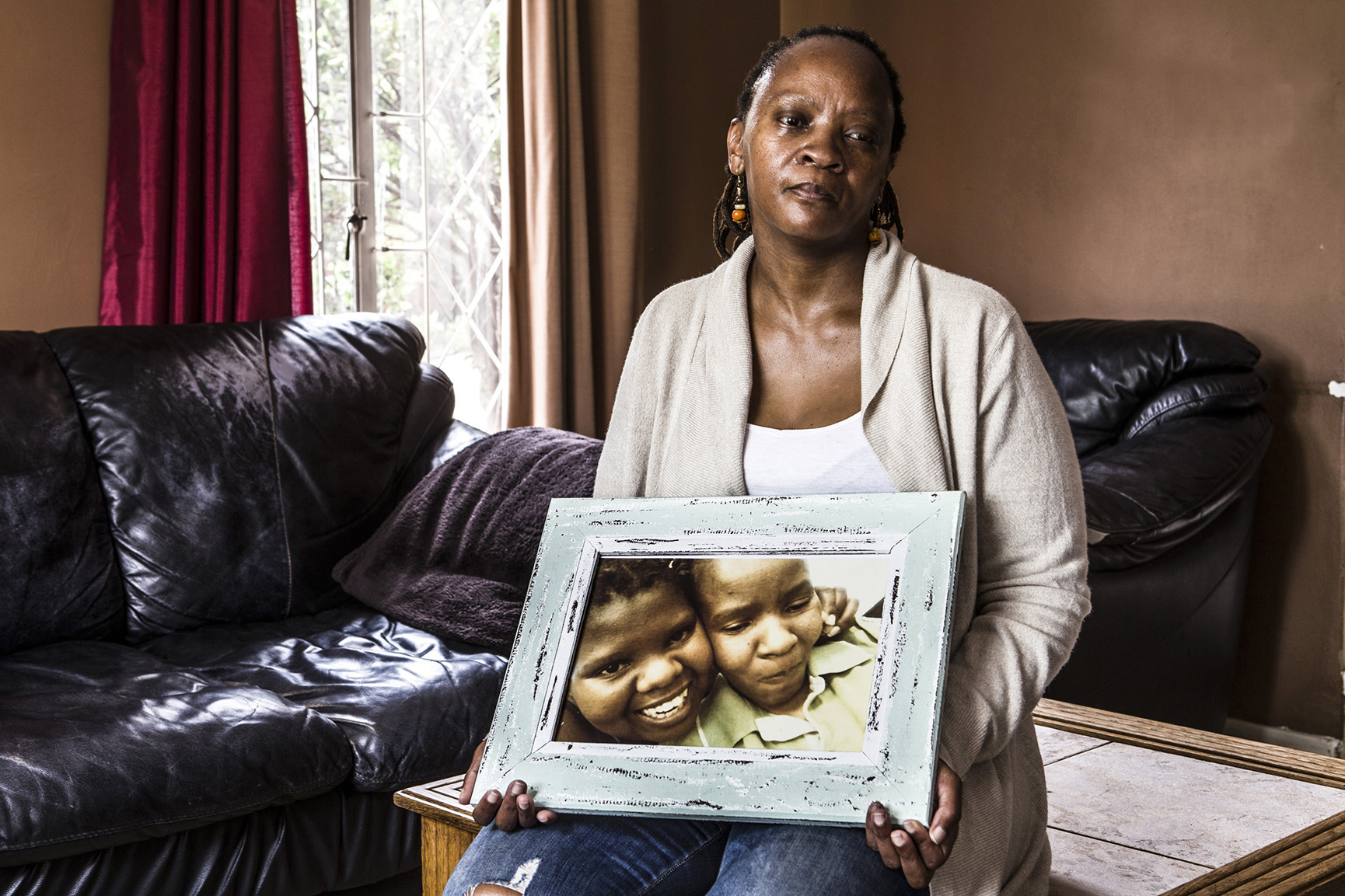 On Monday, 29 July at 3pm, Defend Our Democracy and the New South Institute will host a briefing session with civil society on the progress towards reforming the public service and the role civil society can play.
On Monday, 29 July at 3pm, Defend Our Democracy and the New South Institute will host a briefing session with civil society on the progress towards reforming the public service and the role civil society can play.
The virtual discussion “will unpack the Public Service Act and the current initiatives under way to amend it, highlighting why these reforms are so important”.
Speakers include Ivor Chipkin, director of the New South Institute and leading scholar in government and performance in South Africa, Yoliswa Makhasi, director-general of the Department of Public Service and Administration, and Neeshan Balton, executive director of the Ahmed Kathrada Foundation.
Register here.
 On Tuesday, 30 July at 10am, the SARChl Chair in Multilevel Government, Law and Development at the Dullah Omar Institute, in collaboration with the Catholic Parliamentary Liaison Office and the Hanns Seidel Foundation, will host a webinar on the topic, “Revisiting coalitions: impact of the GNU on governance, intergovernmental relations and local government”.
On Tuesday, 30 July at 10am, the SARChl Chair in Multilevel Government, Law and Development at the Dullah Omar Institute, in collaboration with the Catholic Parliamentary Liaison Office and the Hanns Seidel Foundation, will host a webinar on the topic, “Revisiting coalitions: impact of the GNU on governance, intergovernmental relations and local government”.
“On 29 May 2024, South Africa held its national and provincial general elections, the most stiffly contested since 1994. No political party won a majority in the National Assembly and the provincial legislatures of Gauteng, Northern Cape and KwaZulu-Natal, and alliances were formed between political parties to govern at the national level and in these three provinces. Following the elections, 11 parties joined the ‘government of national unity’ (GNU). The GNU’s statement of intent sets out a framework for how the parties will work together, including the formation of a government. This framework includes nine basic minimum programme priorities in which the parties commit to tackling unemployment, poverty and inequality; stabilising local government; professionalising the public service; and fighting crime and corruption, among other objectives. In this webinar we will unpack the GNU’s potential impact on areas such as stable governance, public service delivery, intergovernmental relations, devolution of functions, and local government. We will also draw comparative lessons from other countries that have experienced a GNU,” he organisers say.
Speakers include Professor Jaap de Visser, the national research chair in multilevel government, law and development at the Dullah Omar Institute, UWC; Professor Joleen Steyn Kotze, the chief research specialist at the Human Sciences Research Council; Lukhona Mnguni, the acting executive director of the Rivonia Circle; Dr Nonhlanhla Ngcobo, a lecturer in the law faculty at North-West University; and Dr Conrad Bosire, an independent consultant & former chief of staff in the Kenyan judiciary.
Register here.
 On Wednesday, 31 July at 6pm, there will be a virtual event titled “Life Esidimeni: Portraits of Lives Lost”. It will include Koketso Moeti in conversation with Harriet Perlman (author), Christine Nxumalo (mental health activist and member of the Life Esidimeni Family Committee) and Sasha Stevenson (human rights lawyer and the executive director of SECTION27) as they explore the ongoing struggle for better mental healthcare in South Africa and the urgent need to ensure such a tragedy never happens again.
On Wednesday, 31 July at 6pm, there will be a virtual event titled “Life Esidimeni: Portraits of Lives Lost”. It will include Koketso Moeti in conversation with Harriet Perlman (author), Christine Nxumalo (mental health activist and member of the Life Esidimeni Family Committee) and Sasha Stevenson (human rights lawyer and the executive director of SECTION27) as they explore the ongoing struggle for better mental healthcare in South Africa and the urgent need to ensure such a tragedy never happens again.
“In 2016, 144 people with mental illness died in the care of the public health system in Gauteng – from neglect, starvation and torture. They died at the hands of those who were supposed to protect them. Even today, their family members grapple with the unimaginable loss of their loved ones,” the organisers say.
“A measure of justice has been achieved for this tragedy. Presided over by former Deputy Chief Justice Dikgang Moseneke, families were awarded damages for the loss of their loved ones in the arbitration in 2021. And crucially, on 10 July 2024, Judge Mmonoa Teffo determined that former Gauteng health MEC Qedani Mahlangu and the then mental health director, Dr Makgabo Manamela, can be held accountable for the deaths of some Life Esidimeni patients.
“But the fight for true justice continues and understanding that the Life Esidimeni tragedy was not a faceless tragedy, writer Harriet Perlman and photographer Mark Lewis have documented the families’ loss and sorrow in a book to be released in mid-August.
“The portraits and stories in Life Esidimeni: Portraits of Lives Lost are a testament to the human cost of this disaster. The book explores this heartbreaking event by offering a powerful narrative built on the stories of those most affected. But it is not merely a chronicle of loss: it is also a celebration of resilience and courage.”
Register here.
World Breastfeeding Week is from 1 to 7 August.
Breastfeeding is one of the most effective ways to ensure a child’s health and survival. However, contrary to the World Health Organization’s recommendations, fewer than half of infants under six months are exclusively breastfed.
According to the United Nations, breast milk is the ideal food for infants. It is safe and clean and contains antibodies that help protect against many common childhood illnesses. It provides all the energy and nutrients an infant needs for the first months of life, and continues to provide up to half or more of a child’s nutritional needs during the second half of the first year, and up to one-third during the second.
Breast-fed children perform better on intelligence tests, are less likely to be overweight or obese, and less prone to diabetes later in life. Women who breastfeed also have a reduced risk of breast and ovarian cancers. Inappropriate marketing of breast milk substitutes continues to undermine efforts to improve breastfeeding rates and duration worldwide.
 On Thursday, 1 August at 1pm, the Public Affairs Research Institute (PARI) will host a seminar on “Urban Power: Democracy and Inequality in São Paulo and Johannesburg”.
On Thursday, 1 August at 1pm, the Public Affairs Research Institute (PARI) will host a seminar on “Urban Power: Democracy and Inequality in São Paulo and Johannesburg”.
The speaker is Benjamin Bradlow, assistant professor of sociology and international affairs at Princeton University, appointed in both the Department of Sociology and the School of Public and International Affairs.
Join via Zoom with the meeting ID: 938 4070 8080. Passcode: 918068.
Attend in person at PARI’s offices: 2 Sherwood Road, Forest Town, Johannesburg. DM





